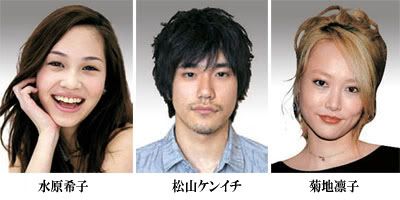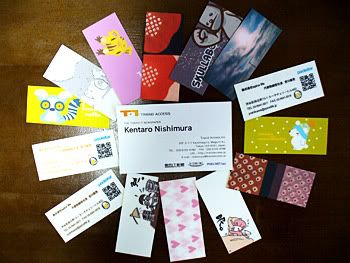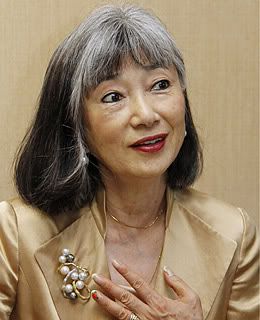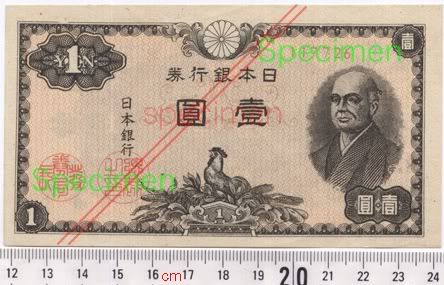September 29, 2009
JLPT 2級文法のまとめ 3
みなさん、こんにちは!
私の学校でも、JLPTのコースに申し込む人が増えてきました。
みなさんもがんばってくださいね!
今日は2級文法の5と6です。
5. 逆接 (adversative conjunction )
① けれど・しかし
1. ~つつ : even though : 悪いと知りつつ友達の宿題をそのまま書いて出した。
2. ~ながら : even while, although
:残念ながら負けてしまった。
3. ~ものの : although, notwithstanding
: 頭ではわかっているものの、するのは難しい。
4. ~たところ : when
:彼の家に行ったところ留守だった。
② ~のに
1. ~くせに/~くせして : despite the fact that
: 歌がへたなくせに、マイクを離さない。
2. ~にもかかわらず : even though
: 山田さんは忙しいにもかかわらず手伝ってくれた。
③ ~ても
1. ~からといって : just because ・・・doesn't necessarily mean
: アメリカに住んでいたからといって、英語がうまいわけではない。
6. 条件 (conditionals)
① 順接条件 (coordinating conditional)
1. ~たとしたら/~とすれば : if judged that
: 今100万円あったらとしたら、どうする?
2. ~てからでないと/~てからでなければ : not until after
:彼は今出張中だから来週からでないと始められない。
② 逆接条件 (adversative conditonal)
1. たとえ~ても : even if
: 主人はたとえ雨がふってもゴルフに行く。
2. ~としても : even supposing
: もし大金持ちだとしても、働いていたい。
3. ~にしろ/~にせよ : even if , whether or not
: たとえお金がないにしろ、食事はしっかりとるべきだ。
4. ~といっても : may be, but ・・・ in name only
: アメリカに住んだことがあると言っても、たった1ケ月だけです。
September 27, 2009
メタボ (metabolic syndrome)
みなさん、こんにちは!
“Japanese foods are considered to be healthy”, I think you have that image.
However, it is said that one out of five people are obese due to Western foods influence.
The word “Metabo” (short for metabolic syndrome) is newly created.
“Metabo” is a state of disease that will lead to heart disease or stroke and its main causes are obese, diabetes, high blood pressure or hyperlipidemia.
Gentlemen, if your waist size is over 90cm (35inch), trim excess fat!
Men’s underwear that makes you slim just wearing it is sold these days.
日本食は体にいい、というイメージがあると思いますが、今では欧米の影響を受けて5人に1人は肥満だと言われています。
「メタボ(メタボリックシンドローム)」という言葉もできました。
メタボは心臓病や脳卒中の原因になりやすい病的な状態のことで、肥満・糖尿病・高血圧高脂血症などが原因です。
男性のみなさん、ウエストが90cm以上だったらやせましょう!
最近では男性用の”はくだけでやせる”という下着も売れているそうですよ。
- words & phrases -
日本食(にほんしょく): Japanese meal
欧米(おうべい)の: Western
影響(えいきょう)を受(う)ける: affected
5人に1人: one out of five
肥満(ひまん): obese
メタボリックシンドローム: metabolic syndrome
心臓病(しんぞうびょう): heart disease
脳卒中(のうそっちゅう): stroke, cerebral stroke
原因(げんいん): cause
病的(びょうてき)な状態(じょうたい): state of disease, pathological condition
糖尿病(とうにょうびょう): diabetes
高血圧(こうけつあつ): high blood pressure
高脂血症(こうしけっしょう): hyperlipidemia
最近(さいきん): lately, these days
男性用(だんせいよう): for men
やせる: slim down, lose weight
下着(したぎ): underwear
販売(はんばい)されている: be sold
September 26, 2009
JLPT 2級文法のまとめ 2
みなさん、こんにちは!
今日も2級文法について書きます。この前の続きで2番から。
2. 原因・理由・結果 ~ので/~から 1. ~から(に)は : now that ・・・then naturally
一度引き受けたからには最後までやるべきだ。
2. ~以上は : so long as, since・・・then naturally
代表に選ばれた以上は頑張らなければならい。
3. 主題 (topic) ~は/~も
1. ~といったら : when it comes to その時のうれしさといったら、言葉では言えないぐらいだ。
2. ~というと/~といえば : whenever ・・・ comes to mind
冬のスポーツといえばやっぱりスノボだね。
3. ~にしたら/~にすれば : even if (hypothetical adversative)
もし新しい仕事を探すにしてもこの不景気では難しい。
4. 強調 (emphasis)
① 限定 (limitation) による強調 ~だけ
1. ~に限って/~に限り : only in the case of
かさがない日に限って雨がふる。
2. ~からして : even ・・・is such, so of course, everything else is ・・・
あの人はモデルだから、歩き方からして違う。
② 2つ以上のことを言って強調する
1. ~はもとより : of course これにはビタミンCはもとよりビタミンA、Eなども入っている。
2. ~どころか : (exact opposite) hardly the case,
ディズニーランドはこんでいて、楽しいどころかたいへんだった。
(contrast in level) cannot even
今日はいそがしくて、ランチどころかコーヒーも飲んでいない。
3. ~に限らず : not limited to ~だけではなく
週末に限らず平日もジョギングをしている。
September 23, 2009
JLPT 2級文法のまとめ 1
みなさん、こんにちは!
今日は久しぶりにJLPT2級の文法について書きましょう。それぞれの文法を意味別にまとめたものです。
(接続の形は書きませんので、自分で確認してください。)
テストのとき、同じグループの文法は答えの中のChoiceにいっしょに出てきません。
つまり、こういう問題と答えのChoiceはありません。
(例)
授業が終わった_____、教室を飛び出して行った。
1.か終わらないかのうちに 2.とたん 3.次第 4.かと思うと
(答えは下の1-①の同じグループ入っている)
(この例は4以外は接続もだめですから、すぐに答えがわかると思いますが)
ですから、意味で一緒に覚えるといいですね。
次に、接続の形を覚えましょう。
(例)
代金がこちらに____次第、商品を発送します。
1.届く 2.届き 3.届いて 4.届いた
答えは2.~次第は"ますFormのStem"に接続しますね。
この接続の形を聞かれる問題は少ないですから、
最初に同じ意味のグループで覚えたほうがいいと思います。
JLPTまであと2カ月ぐらいですね!
みなさんがんばってくださいね!
1. 時・場合・状況 (time, case, situation)
① すぐ・同時・~してすぐに
1. ~たとたん(に): just at the very moment : 家を出たとたん雨が降ってきた。2. ~(か)と思うと/~(か)と思ったら: no sooner than
: 光ったと思ったら雷が鳴った。3. ~か~ないかのうちに: just barely ・・・ when
: ベッドに入るか入らないかのうちに寝てしまった。4. ~次第: as soon as
: ニューヨークに着き次第連絡します。
② いろいろなことがあって最後に
1. ~あげく(に): ended up ・・・
: 30分も待たされたあげく会えなかった。2. ~の末(に)/~た末(に)/~た末の: finally
: 長い間考えた末の結論だ。
③ 2つの事がいっしょに
1. ~ついでに: while, at the same time
: 駅まで行くついでに銀行に行く
④ ~のとき・~するとき・~する前
1. ~にあたって/~にあたり: on the occasion of
: ご利用にあたって注意事項をよく読んでください。2. ~に際し(て)/~に際しての: when
: 商品の購入に際し手続きが必要です。
⑤ 事が続く
1. ~つつある: progression (be doing)
: この国の生活水準は向上しつつある。
September 22, 2009
村上春樹 「ノルウェイの森」 Haruki Murakami "Norwegian Wood"
みなさん、こんにちは!
It is perfect for reading books on a “long autumn night”.
I also read a book that I have wanted to read during this long holiday.
Do you know Japanese world famous writer Haruki Murakami?
I read one of his bestseller “Norwegian Wood (1987)” during this holiday.
I felt that it’s been a long time to find a book that I could be absorbed in reading.
By the way, this “Norwegian Wood” will be made into a movie directed by Tran Anh Hung who is Vietnamese French.
It will be released in next year autumn.
It is always said book is better than movie, I wonder how it will be.
Looking forward to it.
Casting

秋は夜が長く、「秋の夜長」と呼ばれている。
そんな夜には読書がぴったり。
私もこの連休中にずっと読みたいと思っていた本を読みました。
世界的に有名な村上春樹を知っていますか?
彼のベストセラー「ノルウェイの森」(1987年)を読みました。
久しぶりに没頭して読める本に出会った、というのが感想です。
ところでこの「ノルウェイの森」がベトナム系フランス人のトラン・アン・ユン監督により映画化されます。
来年の秋に公開予定です。
映画より原作の方がおもしろい、とよく言われていますが、この作品はどうなるのでしょうか。
楽しみです。
- words & phrases -
秋(あき)の夜長(よなが): long autumn night
読書(どくしょ): reading books
ぴったり: match, suit, perfect, good
この連休中(れんきゅうちゅう): during this holiday
読(よ)みたいと思(おも)っていた本(ほん): the book that I have wanted to read
世界的(せかいてき)に有名(ゆうめい)な: world famous
村上(むらかみ)春樹(はるき): Haruki Murakami writer
没頭(ぼっとう)する: devote oneself, in,
出会(であ)う: to meet unexpectedly
感想(かんそう): impression
ベトナム系(けい)フランス人(じん): French of Vietnamese ancestry
監督(かんとく): director
映画化(えいがか)される: be made into movie
公開(こうかい)予定(よてい): scheduled to be released
原作(げんさく): original (book)
よく言(い)われている: it is always said that
September 20, 2009
名刺(めいし) Business Card
みなさん、こんにちは!
Meishi = Business card which is necessary item when you work in Japan.
It is very useful when you remember name and company.
But I am sure you do not want to give it in non business situations?
How about this wonderful compact “meishi” ?
It would be very nice.
You can order it through the web site, you can choose your favorite photos and very reasonable price, 1000yen for 25 cards.

pocketer(ポケッター)
日本で仕事をするときに絶対に必要な名刺。
名前と会社名を覚えるのにとても便利ですね。
でも仕事以外の場所で、会社の名刺を出したくないですよね?
そんなとき、コンパクトでこんな素敵な名刺を渡すといいですね!
Web Site から自分の好きな写真を使って簡単に注文ができて、25枚で1000円というお手頃な価格も魅力。
- words & phrases -
絶対(ぜったい)に: absolutely, for sure
名刺(めいし): business card
必要(ひつよう)な: necessary
覚(おぼ)える: to memorize
便利(べんり): convenient
~以外(いがい): except ~
場所(ばしょ): situation, location, place
素敵(すてき)な: wonderful, great, lovely
渡(わた)す: to hand, to give
簡単(かんたん)に: easily,
注文(ちゅうもん)する: to order
お手頃(てごろ)な: reasonable, affordable,
価格(かかく): price
魅力(みりょく): attractive, appealing
September 19, 2009
日本人平均寿命、また延びた The average Japanese life expectancy gets longer again
みなさん、こんにちは!
September 21st is “Respect Senior Citizen Day”.
Let’s read an Internet article today.
The average Japanese life expectancy gets longer again
Woman keeps the longest
The average Japanese life expectance for me is 79.29 years old and women is 86.05 years old, 0.10 and 0.06 for each over than the last year.
It hits the record for 3 consecutive years.
According to the Health, Labour and Welfare Ministry, Japanese women live longest in the world for 24 years and for men is the fourth.
Here is a cute story that makes you smile.
The oldest men in Japan interviewed and asked his types of women.
He answered “I like someone older than me.”

by 虹色トレイン
9月21日は敬老の日です。
今日はインターネットのニュースを読んでみましょう。
日本人平均寿命、また延びた
女性は世界一をキープ
2008年の日本人の平均寿命は男性が79.29歳、女性は86.05歳で、前年をそれぞれ0.10歳、0.06歳上回り、3年連続で過去最高を更新した。
厚生労働省によると、女性は24年続けて世界で最も長寿で、男性は4位だった。
- words & phrases –
敬老(けいろう)の日(ひ): Respect-for-Senior-Citizens Day
(national holiday, September third Monday
平均寿命(へいきんじゅみょう): average life expectancy
前年(ぜんねん): last year
それぞれ: each
上回(うわまわ)る: be a little more than ~
連続(れんぞく)で: consecutive, successive
過去(かこ)最高(さいこう):record
更新(こうしん):establish a new record
厚生労働省(こうせいろうどうしょう):Health, Labour and Welfare Ministry
長寿(ちょうじゅ): longevity
September 18, 2009
シルバーウィーク Silver Week
みなさん、こんにちは!
Thanks to “Happy Monday system”, a national holiday “Respect for the Senior Citizen Day” which used to be Sep 15 moves to the third Monday of September.
So in 2009, Sep 21st (Mon) is the day, also 23rd (Wed) is another holiday which is “Autumn Equinox day”.
If there is a weekday between two holidays, the day also becomes holiday called “Kokumin no kyukujitu”.
Therefore, from Sep. 20th to 23rd becomes four consecutive national holidays, becomes a five-days-holiday if 19th (Sat) is included.
This long holidays are recently called “Silver week” however, this is not a permanent one because “Respect for Senior Citizen Day” is the third Monday by current law.
After 2009, we do not have such long holidays until 2015.
The origin of the word “Silver week” is that “silver against gold (there is longer successive holidays in April-May which is called “Golden Week”) and because one of the days is “Respect of Senior Citizen Day”, it is said that the word silver comes from “silver seat = priority seats“
Wikipedia
ハッピーマンデー制度により敬老の日が9月第3月曜日となったため、2009年は秋分の日(9月23日)の前々日である9月21日が祝日となり、間の9月22日が国民の休日となる。
この結果、9月20~23日が四連休となり、9月19日(土曜日)を含めると五連休となる。
2009年から新たにシルバーウィークと呼ばれる大型連休だが、現行法では敬老の日が第3月曜日のため恒久的なものではなく、2009年の次は2015年までこの大型連休は出現しない。
シルバーウィークの語源は、金に対しての銀のほか、連休の中に敬老の日が含まれるためにシルバーシート(優先席)から取られたともいわれる。
Wikipedia
- words & phrases -
ハッピーマンデー制度(せいど): Happy Monday system
There are some national holidays are moved to Monday in order to create a three-day-holiday weekend.
敬老(けいろう)の日(ひ): Respect of Senior Citizen Day
9月(がつ)第(だい)3月曜日(月曜日): third Monday of September
秋分(しゅうぶん)の日(ひ): Autumn Equinox Day
前々日(ぜんぜんじつ): two days before
祝日(しゅくじつ): national holiday
国民(こくみん)の休日(きゅうじつ): A weekday becomes a national holiday if it is sandwiched between two national holidays to create longer holidays.
結果(けっか): result
四連休(よんれんきゅう)、五(ご)連休: 5/6 days successive holidays
含(ふく)める: includes
新(あら)たに: newly
呼(よ)ばれる: called
大型(おおがた)連休(れんきゅう): long holidays
現行法(げんこうほう): current law
恒久的(こうきゅうてき): permanent
出現(しゅつげん)しない: appears, not to have
語源(ごげん): origin of a word
対(たい)して: against
金(きん)、銀(ぎん): gold , silver
シルバーシート: reserved seats for special assistance passengers
優先席(ゆうせんせき): ditto
September 15, 2009
Japanese First Lady rode on a UFO?
みなさん、こんにちは!
I am not writing about politics here but one thing that I would like to write about is incoming Japanese first lady, Miyuki Hatoyama.
Ok, here is an article of Yomiuri Online.

Mrs. Miyuki Hatoyama
Ms. Hatoyama rode on a UFO? captured American Media attention
(Sep.5, 2009 11:52 Yomiuri Shimbun)
US Media pay attention to Japanese incoming Prime Minister Hatoyama who is the head of the Democratic Party, but also they have a strong interest in Mrs. Hatoyama, Miyuki.
CNN introduced her she said “My soul road on a UFO and went to Venus“, "I am eating the Sun” or “Tom Cruise was Japanese” titled “Spacey new first lady”
CNN News :
UFOに乗った?鳩山夫人に米メディア注目
米メディアは、日本の首相に就任する予定の鳩山民主党代表に注目するが、夫人の幸さんにも強い関心を持っている。
CNNテレビは4日、「日本の風変わりな新ファーストレディー」のタイトルを付けながら、幸夫人が著書などで「寝ている間に、私の魂がUFOに乗って金星に行った」「私は太陽を食べている」「トムクルーズは日本人だった」といった発言をしたことがあると紹介している。
(2009年9月5日11時52分 読売新聞)
- words & phrases –
UFO : unidentified flying object
鳩山(はとやま)夫人(ふじん): Mrs. Hatoyama
米(アメリカ)メディア: American Media
注目(ちゅうもく): attention
幸(みゆき)夫人: Mrs. Miyuki (Hatoyama)
首相(しゅしょう): prime minister
就任(しゅうにん)する: assume, be installed
予定(よてい): scheduled
民主党(みんしゅとう): the Democratic Party
代表(だいひょう): the head
強(つよ)い関心(かんしん)を持(も)っている: have a strong interest
風変(ふうが)わりな: odd, weird, strange
著書(ちょしょ): books (that she wrote)
寝(ね)ている間(あいだ)に: while I am sleeping
魂(たましい): soul
UFOに乗(の)って: took/rode a UFO
金星(きんせい)に行(い)った: went to Venus
太陽(たいよう): the Sun
発言(はつげん)をした: said
紹介(しょうかい)している: introduced
September 13, 2009
四字熟語 「積小為大」
みなさん、こんにちは!
Do you know 「四字熟語=Yoji-jukugo」 ?
"Yoji-jukugo” is made by four Chinese characters and it usually became proverbs or idiomatic phrases.
「積小為大=Sekishoidai」 is one of them and said by Kinjiro Ninomiya.
Each Chinese character has its meanings, so let’s take a look at each of them.
積(せき): to pile, to accumulate
小(しょう): small
為(い): becomes
大(だい): big
"If you wish to do something big, you need to make efforts even for small things.”
or “Accumulation of small efforts brings great success”.
Sounds like Japanese study! ^^
Gambarimasho!

Kinjiro Ninomiya on 1yen bank, 1946
四字熟語を知っていますか?
漢字4文字の熟語で、ことわざのように慣用句となっているものが多い。
その中で二宮金次郎が言った 「積小為大」 ということばがあります。
漢字にはひとつずつ意味がありますね。
では「積小大為」の漢字を見てみましょう。
積(せき): to pile
小(しょう): small
為(い): becomes
大(だい): big
「大きなことをしようと思ったら、小さなこともがんばらなければならない」
または、「ちいさな努力の積み重ねが大きな成功になる」
という意味です。
日本語の勉強も積小大為ですね!
がんばりましょう!
- words & phrases -
四字熟語(よじじゅくご): four Chinese character idiomatic compounds
知(し)っていますか: do you know?
漢字(かんじ)4文字(もじ)の熟語(じゅくご): same meaning of 四字熟語
ことわざ: proverb
慣用句(かんようく): idiomatic expression
二宮(にのみや)金次郎(きんじろう): Kinjiro Ninomiya
積小大為(せきしょうたいい): accumulation of small efforts bring great success
意味(いみ): meaning
見(み)てみましょう: let’s take a look at ~
大(おお)きなことをしようと思(おも)ったら: if you think to do something big
小(ちい)さなことも: even if something small
努力(どりょく): effort
積(つ)み重(かさ)ね: to accumulate, buildup
成功(せいこう): sucess
September 6, 2009
skip 2kyu and aiming 1kyu?
みなさん、こんにちは!
7月のJLPTの結果が来ましたね。
受かった人、おめでとうございます!
受からなかった人、残念でしたね。 12月にまたがんばってください!
By the way what do you think of this case?
There was a new student who was interested in our school’s JLPT preparation courses.
She said she wanted to try 1kyu for this December.
But actually, she has not passed 2kyu yet even she had tried it 3 times before.
So, would you also want to move onto 1kyu in this case?
I would say better not.
Why?
OK, if you can get 60% you can pass 2kyu.
60% means, almost half, so you can pass even if you do not understand half of what you have studied.
Study language is sort of building up from easier to more difficult grammars for not only beginners but for these high levels students too.
So I would rather say if you can reach 70-80 % of 2kyu result, then you can go to 1kyu study.
I really understand you would like to go to 1kyu because it is the highest.
But actually there is no shortcut.
It would take much longer if you skip 2kyu and move to 1kyu.
Don’t rush!
I know everybody is busy, you do not have so much time for study Japanese.
It is not so much fun study Japanese only for JLPT.
It would be the best way if you study Japanese with lots of fun and eventually your Japanese level goes up to 2kyu or 1kyu and then you can pass it automatically without any pains.
September 5, 2009
日本はなんでも高い? Is everything expensive in Japan?
みなさん、こんにちは!
Do you think “Everything is expensive in Japan!” ?
Actually, there are both expensive and inexpensive things in Japan.
For example “100yen shop”, also called “hyakkinn”, is very cheep.
All products are sold 100yen.
You can almost say that there is nothing you cannot buy at 100yen shops, they have many variety of items.
Many students come to Japan buy souvenirs at the shops too.
The photo below is Daiso, near Harajuku station.

Daiso Harajuku Shop

Daiso shop
「日本はなんでも高い」と思っていませんか?
実は、日本には高いものと安いものどちらもあります。
たとえば「100円ショップ」。
「100均(ひゃっきん)」(100円均一)とも言われています。
お店の商品はもちろん全部100円。
100円ショップで買えないものはない、と言えるぐらい、色々なものが買えます。
日本に来る生徒さんはよく100円ショップでおみやげを買っています。
写真は原宿の100円ショップ「ダイソー」。
- words & phrases -
なんでも: anything, everything
実(じつ)は: actually
商品(しょうひん): products, goods
100円(えん)均一(きんいつ): flat rate of 100yen
全部(ぜんぶ): all
買(か)えないものはない: there is nothing you cannot buy
~と言(い)えるぐらい: you can almost say that ~
原宿(はらじゅく): one stop from Shibuya station
September 4, 2009
冷ます vs 冷やす 2
みなさん、こんにちは!
What are the differences between 「冷(さ)ます」 and 「冷(ひ)やす」?
Let’s take a look at the online Japanese dictionary that I also use quite often.
さま・す【冷ます】
1 熱(あつ)い物(もの)の、熱(ねつ)を失(うしな)わせる。
「スープを冷(さ)ます」
To make something hot to cool it down.
“To cool the soup down.”
ひや・す【冷(や)す】
1 冷(ひ)えた状態(じょうたい)にする。つめたくする。
To make something to a cold condition state. To chill.
「冷蔵庫(れいぞうこ)に入(い)れてビールを冷(ひ)やそう」
“Let’s put the beer into the fridge to chill.”
「冷ます」 is used for something hot now.
If you are not sure differences between two words when you checking in Japanese – English dictionary, for example, try check Japanese - Japanese dictionary too.
September 1, 2009
冷ます vs 冷やす
みなさん、こんにちは!
The typhoon #11 has been gone, it was not that bad than we have heard which was good.
Today I have a quiz for you.
What are the differences between 「冷(さ)ます」 and 「冷(ひ)やす」?
The followings are from the online dictionary which I use quite a lot :
· 冷ます
cool down // damp down(熱意を)
【他動詞(transitive verb)】
1. chill
2. cool
· 冷やす
cool down
【他動詞(transitive verb)】
1. chill
2. cool
3. refrigerate(食料・飲料などを保存するために= in order to preserve beverages and foods)
Seems like English translations are almost the same.
I think this is one of the difficult parts that you find right words when you write/speak.




